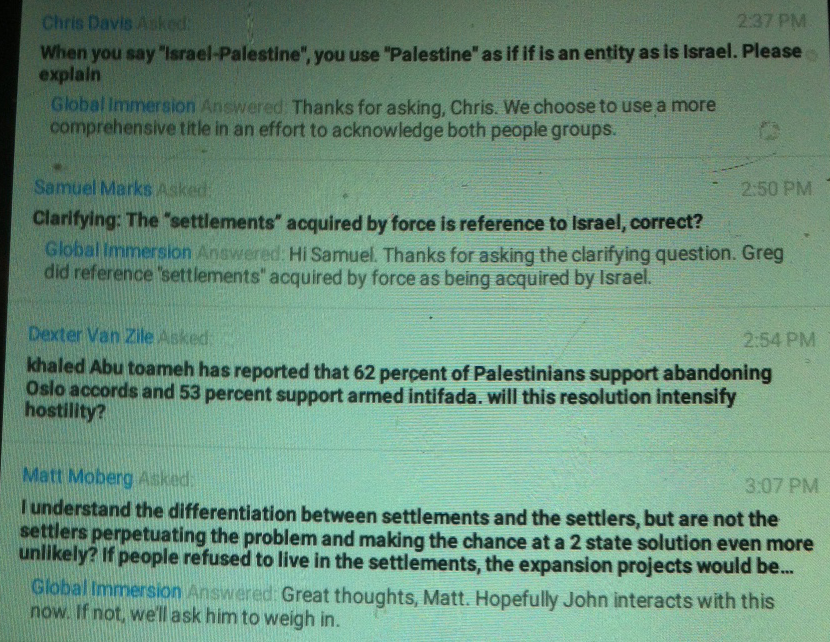Global Immersion Project Ignores Incovenient Truth

On our main website, we recently posted an article about a poll of Palestinian public opinion conducted by the Palestinian Center for Policy and Survey Research headquartered in Ramallah.
The poll, which hasn’t gotten much attention in the English-speaking media, offers some pretty discouraging information. It reveals that 62 percent of the respondents interviewed want to abandon the peace process as enunciated by the Oslo Accords and that 53 percent of respondents support an armed intifada against Israel.
The report also shows that more than 70 percent of the respondents want Mahmoud Abbas, President of the Palestinian Authority, to step down. Palestinians do not want Abbas as their president. This raises serious questions about the prospects for peace at least in the near term. Palestinians have apparently given up on a two-state settlement, support violence against Israel and do not support the presidency of the man Israel is supposed to negotiate with.
For one reason or another, this poll has not gotten much play in the international media, probably because it highlights the problems in Palestinian society that hinder the prospects for peace. Problems such as incitement, a refusal to acknowledge Israel’s right to exist, corruption in the Palestinian Authority, and a crisis of legitimacy suffered by Mahmoud Abbas, contradict the “It’s all Israel’s fault” narrative that has taken root in many newsrooms and think tank offices.
Just to get a sense of how taboo the subject of Palestinian intransigence and hostility is, take a look at the image posted above. Yes, it’s kind of grainy and disorienting, but it documents just how deep the denial goes.
The image is cell-phone photo taken by CAMERA researcher Dexter Van Zile, who had submitted a question to a webinar organized by the Global Immersion Project, a Christian organization that supports activists dealing with a number of issues throughout the world.
The webinar, which took place on Jan. 2, 2017, was offered as an opportunity to hear activists and experts about the issues surrounding UN 2334, the Security Council resolution which condemned the construction of homes for Israelis in the West Bank. The passage of this resolution on Dec. 23, 2016 sparked an enormous amount of debate, so the Immersion Project’s to host a webinar on the subject was very timely.
As you can see from the photo, Dexter asked a very specific question in the “chat” window displayed alongside the vide of the webinar. The question read as follows:
Khaled Abu Toameh has reported that 62 percent of Palestinians support abandoning Oslo accords and 53 percent support armed intifada. Will this resolution intensify hostility?
As it turns out, the source for Toameh’s information was the poll cited above, which had just been released a few days prior to the webinar.
For one reason or another, the question never got answered either in the discussion during the webinar itself, nor was it responded to in the “chat” window. It was simply ignored by both the organizers and the activists who were participating in the discussion. On one hand, that’s no big deal, not every question gets answered.
But in this case, it was the only “chat” question submitted that was treated this way. All seven of the other questions were acknowledged and answered one way or another, but not this one.
Now why is that? It was a perfectly reasonable question in light of the history of the Arab-Israeli conflict. UN resolutions are regularly invoked to justify violence against Israelis by Palestinian terrorists. In light of this history, it seems perfectly reasonable to ask if UN Resolution 2334 will be used to justify another round of Palestinian violence.
Was the question ignored because Khaled Abu Toameh is the “wrong” type of Arab journalist, one who is willing to hold Palestinian elites accountable?
Is it because the person asking the question works for CAMERA?
Or is it because the question itself contradicts the narrative that the folks at the Global Immersion Project want to broadcast?
The last guess seems like the best explanation. When it comes to dealing with the Arab-Israeli conflict there are some things that the pro-Palestinian crowd simply does not want to talk about so they ignore questions (and public opinion polls) they don’t want to hear. If data can’t be used to justify the “It’s Israel’s fault” narrative, many so-called journalists and peacemakers simply ignore it.
But if the events of the past two decades have taught us anything, it is that we ignore reality at our own peril.
More from SNAPSHOTS
Mahmoud Abbas’ Diatribe Threatening Israel Included Bogus Canaanite Claim
September 10, 2019
Palestinian Authority President Mahmoud Abbas’ recent anti-Israel diatribe that aired on PA TV was monitored and translated by Palestinian Media Watch (PMW). Excerpt: "I say to [Israel]: Every stone you have built on our land [...]
CNN Calls House’s Unifying Anti-BDS Vote ‘Divisive’
July 24, 2019
Yesterday, in an overwhelming vote of bipartisan support, the House of Representatives voted 398 to 17 to adopt a resolution opposing the anti-Israel BDS (boycott, divest, sanctions) campaign. Yet, CNN's headline casts the unifying vote [...]
NY Times Cites Poll, Hides Palestinian Support for Violence
July 9, 2019
The New York Times has struggled to accurately describe polls this year. In January, editor Jonathan Weisman misrepresented Pew polling data to describe a nonexistent surge in Israeli support for the United States under President [...]
CNN’s Zakaria Indulges Palestinian Propagandist Hanan Ashrawi
June 9, 2019
Fareed Zakaria’s weekly Cable News Network (CNN) program (grandiosely named “Global Public Square”) June 9 broadcast included a discussion of the current U.S. Middle East peace plan with guests Hanan Ashrawi (Palestinian Authority official) and [...]
In Robert Bernstein Obit, AFP Inappropriately References His Judaism
May 29, 2019
Robert Bernstein (Courtesy the New Press) In its obituary yesterday for American publisher Robert Bernstein, Agence France Presse inserted an inappropriate reference to the Human Rights Watch founder who later turned on the organization due [...]


